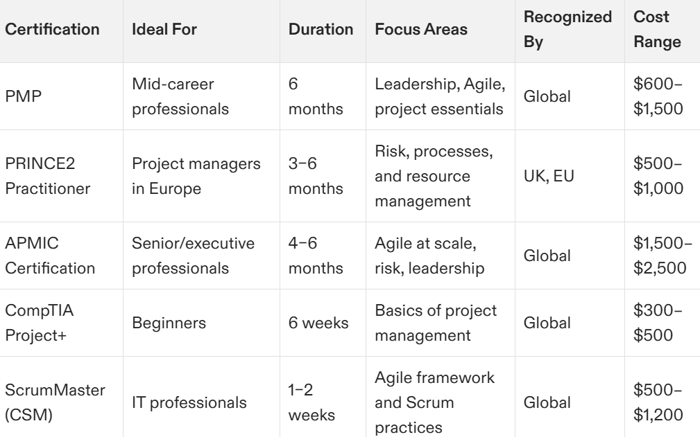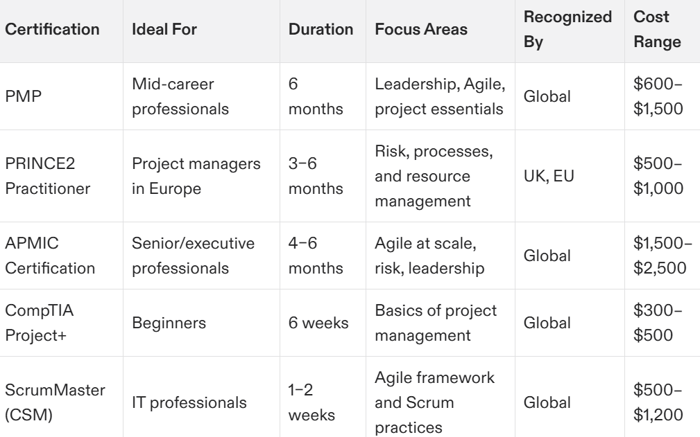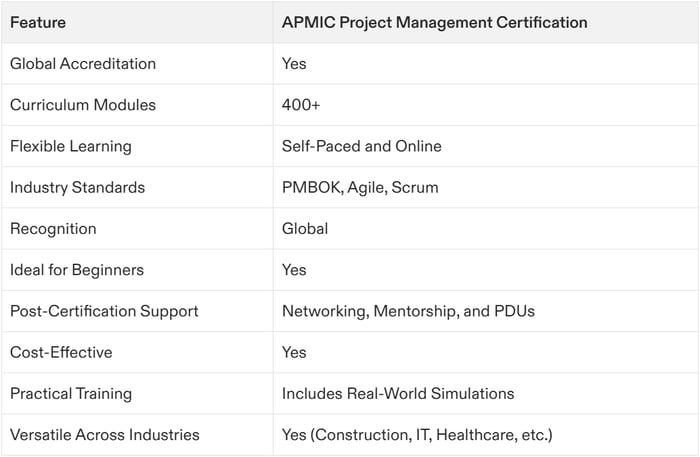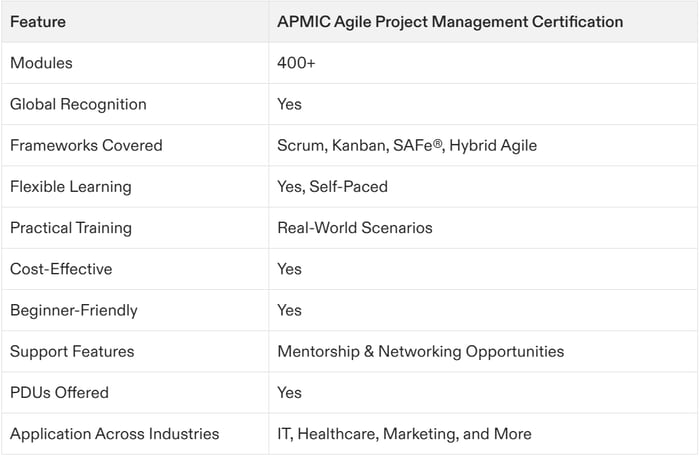The healthcare industry is one of the most intricate and fast-paced sectors, requiring professionals to deliver results quickly, accurately, and within strict regulatory frameworks. Pursuing a Project Management Certification for Healthcare equips you to meet these industry-specific demands while placing you among the most sought-after professionals in the field.
Whether you’re supervising the implementation of an electronic medical records (EMR) system or managing a multi-department hospital project, a focused certification builds your expertise, advances your career, and sets you apart in a competitive market.
Programs such as the APMIC certification are leaders in the field, offering a comprehensive curriculum with over 400 modules tailored to healthcare project management.
Why is a Project Management Certification for Healthcare Important?
Healthcare projects require a special blend of leadership, regulatory compliance, and technical execution. Unlike generic industries, healthcare serves communities on a personal level, making project management both intricate and impactful. A certification like Project Management Certification for Healthcare bridges this gap by developing professionals with the right tools to efficiently handle this complexity.
Key Advantages
- Enhanced Credibility: Certifications such as PMP and APMIC certification instantly establish your professional credibility.
- Targeted Skills: Master critical skills like compliance with health regulations, patient-first project planning, and effective risk mitigation.
- Higher Salaries: Certified project managers in healthcare often command salaries that are 20–30% higher than their non-certified peers.
- Global Recognition: Certifications like those from APMIC give you credentials that are valued worldwide, opening doors to global career opportunities.
Core Areas of a Project Management Certification for Healthcare
Proper certification programs take a deep dive into the key competencies healthcare project managers need. Here’s what a solid curriculum should cover:
- Regulatory Compliance: Adhering to standards like HIPAA and GDPR for patient data privacy.
- Budget Management: Projects within the healthcare space often carry significant financial risk. Certification provides tools to manage finances efficiently.
- Risk Assessment in Healthcare: From managing patient safety risks to controlling vaccine supply chains, healthcare project managers require strong risk mitigation training.
- Agile Methodologies for Healthcare Teams: Agile frameworks help teams remain flexible while adapting to changing healthcare conditions.
- Interdisciplinary Collaboration: Healthcare projects often involve departments ranging from IT to Human Resources, necessitating impeccable coordination and communication.
Top Healthcare Project Management Certifications
With evolving industry needs, several certifications have emerged as valuable for healthcare project managers. Below are the top programs to consider.
1. APMIC Certification
The APMIC certification is clearly a standout. Known for its global reach and exhaustive curriculum, it offers over 400 modules, including healthcare-specific topics like advanced compliance systems and clinical research project management.
- Ideal Candidate: Advanced-level professionals with leadership goals.
- Key Features: Training on large-scale project execution, Agile, and healthcare IT leadership.
- Duration: Flexible, usually completed in 4–6 months.
2. Project Management Professional (PMP)
A globally recognized credential offered by the Project Management Institute (PMI), the PMP emerges as a versatile option for healthcare professionals seeking a broad project management framework.
- Ideal Candidate: Professionals looking for a cross-industry certification adaptable to healthcare.
- Key Features: Covers project planning, resource optimization, and stakeholder communication.
- Duration: Around 6 months.
3. Certified Healthcare Project Manager (CHPM)
Unlike generic certifications, CHPM is designed exclusively for the healthcare sector, tackling hospital operations, public health programs, and patient-centered projects.
- Ideal Candidate: Entry-level to mid-career healthcare professionals.
- Key Features: Focus on operational workflows, resource allocation, and basic compliance standards.
- Duration: 3–4 months.
4. PRINCE2 Practitioner
Initially aimed at European industries, PRINCE2 has gained traction in healthcare for its resource-based project assessment techniques.
- Ideal Candidate: Project managers working across multi-departmental organizations.
- Key Features: Tools for organizing large variables like staff, equipment, and budgets.
- Duration: Approximately 3 months.
5. Lean Healthcare Certification
This certification applies Lean principles to improve healthcare operations by reducing systemic inefficiencies.
- Ideal Candidate: Project managers focused on improving workflows and minimizing waste.
- Key Features: Process optimization and quality improvement strategies.
- Duration: 8–12 weeks.
How to Choose the Right Certification
Selecting the best Project Management Certification for Healthcare requires aligning your career goals, experience level, and desired outcomes with the program’s offerings.
- For Beginners: Start with a foundational program like CHPM to build essential project skills.
- For Experienced Leaders: Advanced professionals can benefit the most from robust certifications like PMP or APMIC.
- Sector-Specific Versus Versatile: If you’re strictly in healthcare, CHPM and APMIC will be more relevant, while PMP and PRINCE2 have wider industry adaptability.
- Budget and ROI: Programs like PMP cost upwards of $600, while APMIC’s $1,500 range offers unmatched coverage and flexibility. Consider the long-term impact these certifications can have on career growth.
FAQ About Project Management Certification for Healthcare
1. What is a Project Management Certification for Healthcare?
It’s a specialized credential tailored for managing projects within the healthcare industry. It combines general project management principles with healthcare-specific knowledge, covering areas like compliance, risk assessment, and patient-focused strategies. Programs like PMP and APMIC certification are exemplary options.
2. Who should pursue this certification?
Healthcare professionals such as hospital administrators, IT project managers, and clinic coordinators who are involved in project management benefit from these certifications.
3. How long does it take to complete?
Timelines vary. Entry-level programs like CHPM take 3–4 months, while advanced certifications like APMIC may last 4–6 months with flexible pacing.
4. Do these certifications improve employability?
Absolutely! Employers often prioritize candidates with proven expertise in healthcare project management, and certification is a reliable benchmark for that skill set.
5. Can I work full-time while earning a certification?
Most certifications, such as PMP and APMIC, are designed for working professionals with flexible online schedules and self-paced modules.
Healthcare Project Management Certification Comparison Table

Final Thoughts
A Project Management Certification for Healthcare is a game-changing credential for professionals in the medical and health services field. It not only builds domain-specific expertise but also provides tools and strategies that significantly impact project success rates across hospital systems, public health initiatives, and healthcare IT advancements.
If you’re looking for an advanced, flexible program, the APMIC certification offers exceptional depth through its 400+ modules, making it the ideal choice for those ready to take charge of complex healthcare projects.
Start your certification today and unlock unmatched career opportunities in healthcare project management!





